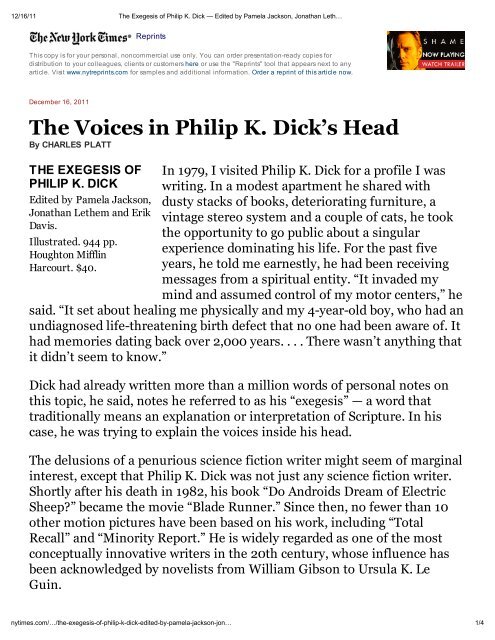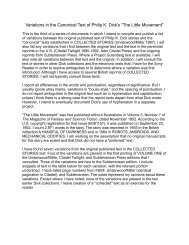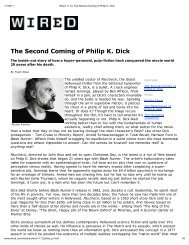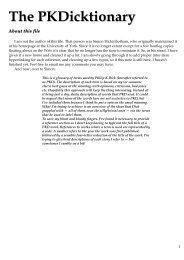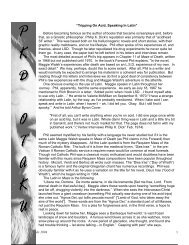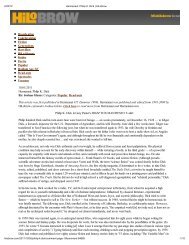The Voices in Philip K. Dick's Head - Philip K. Dick Fan Site
The Voices in Philip K. Dick's Head - Philip K. Dick Fan Site
The Voices in Philip K. Dick's Head - Philip K. Dick Fan Site
Create successful ePaper yourself
Turn your PDF publications into a flip-book with our unique Google optimized e-Paper software.
12/16/11 <strong>The</strong> Exegesis of <strong>Philip</strong> K. <strong>Dick</strong> — Edited by Pamela Jackson, Jonathan Leth…<br />
Repr<strong>in</strong>ts<br />
This copy is for your personal, noncommercial use only. You can order presentation-ready copies for<br />
distribution to your colleagues, clients or customers here or use the "Repr<strong>in</strong>ts" tool that appears next to any<br />
article. Visit www.nytrepr<strong>in</strong>ts.com for samples and additional <strong>in</strong>formation. Order a repr<strong>in</strong>t of this article now.<br />
December 16, 2011<br />
<strong>The</strong> <strong>Voices</strong> <strong>in</strong> <strong>Philip</strong> K. <strong>Dick</strong>’s <strong>Head</strong><br />
By CHARLES PLATT<br />
THE EXEGESIS OF<br />
PHILIP K. DICK<br />
Edited by Pamela Jackson,<br />
Jonathan Lethem and Erik<br />
Davis.<br />
Illustrated. 944 pp.<br />
Houghton Miffl<strong>in</strong><br />
Harcourt. $40.<br />
In 1979, I visited <strong>Philip</strong> K. <strong>Dick</strong> for a profile I was<br />
writ<strong>in</strong>g. In a modest apartment he shared with<br />
dusty stacks of books, deteriorat<strong>in</strong>g furniture, a<br />
v<strong>in</strong>tage stereo system and a couple of cats, he took<br />
the opportunity to go public about a s<strong>in</strong>gular<br />
experience dom<strong>in</strong>at<strong>in</strong>g his life. For the past five<br />
years, he told me earnestly, he had been receiv<strong>in</strong>g<br />
messages from a spiritual entity. “It <strong>in</strong>vaded my<br />
m<strong>in</strong>d and assumed control of my motor centers,” he<br />
said. “It set about heal<strong>in</strong>g me physically and my 4-year-old boy, who had an<br />
undiagnosed life-threaten<strong>in</strong>g birth defect that no one had been aware of. It<br />
had memories dat<strong>in</strong>g back over 2,000 years. . . . <strong>The</strong>re wasn’t anyth<strong>in</strong>g that<br />
it didn’t seem to know.”<br />
<strong>Dick</strong> had already written more than a million words of personal notes on<br />
this topic, he said, notes he referred to as his “exegesis” — a word that<br />
traditionally means an explanation or <strong>in</strong>terpretation of Scripture. In his<br />
case, he was try<strong>in</strong>g to expla<strong>in</strong> the voices <strong>in</strong>side his head.<br />
<strong>The</strong> delusions of a penurious science fiction writer might seem of marg<strong>in</strong>al<br />
<strong>in</strong>terest, except that <strong>Philip</strong> K. <strong>Dick</strong> was not just any science fiction writer.<br />
Shortly after his death <strong>in</strong> 1982, his book “Do Androids Dream of Electric<br />
Sheep?” became the movie “Blade Runner.” S<strong>in</strong>ce then, no fewer than 10<br />
other motion pictures have been based on his work, <strong>in</strong>clud<strong>in</strong>g “Total<br />
Recall” and “M<strong>in</strong>ority Report.” He is widely regarded as one of the most<br />
conceptually <strong>in</strong>novative writers <strong>in</strong> the 20th century, whose <strong>in</strong>fluence has<br />
been acknowledged by novelists from William Gibson to Ursula K. Le<br />
Gu<strong>in</strong>.<br />
nytimes.com/…/the-exegesis-of-philip-k-dick-edited-by-pamela-jackson-jon…<br />
1/4
12/16/11 <strong>The</strong> Exegesis of <strong>Philip</strong> K. <strong>Dick</strong> — Edited by Pamela Jackson, Jonathan Leth…<br />
Even <strong>in</strong> his earliest stories, <strong>Dick</strong> wrestled with the nature of perception. As<br />
he described it to me, “I began to get an idea of a mysterious quality <strong>in</strong> the<br />
universe . . . a k<strong>in</strong>d of metaphysical world, an <strong>in</strong>visible realm of th<strong>in</strong>gs halfseen.”<br />
He could not accept the notion of a s<strong>in</strong>gle, objective reality, and<br />
favored Jung’s concept that what we perceive as external may be an<br />
unconscious projection. When he tried to embed these ideas <strong>in</strong> serious<br />
contemporary novels, he found no market for them, and thus used science<br />
fiction as the unlikely vehicle for his philosophical questions.<br />
An example is his disturb<strong>in</strong>g novel “<strong>The</strong> Three Stigmata of Palmer<br />
Eldritch,” <strong>in</strong> which colonists on Mars escape the deprivations of their<br />
environment by us<strong>in</strong>g a drug that opens a gateway to a shared, artificial<br />
reality. But <strong>Dick</strong> takes the concept a step further, suggest<strong>in</strong>g this reality<br />
could be molded by the drug manufacturer; and then a step further still, as<br />
another entity competes to take over and manipulate the reality, along with<br />
the people <strong>in</strong> it. This reflects the other pr<strong>in</strong>cipal obsession throughout<br />
<strong>Dick</strong>’s work: his fear that a powerful person or group can change the<br />
perceptions and beliefs of others. He saw this process <strong>in</strong>flicted by<br />
politicians, religions and “authority figures <strong>in</strong> general.”<br />
After his death, the overlap between his halluc<strong>in</strong>atory experiences and the<br />
concerns <strong>in</strong> his fiction made him a tempt<strong>in</strong>g subject for academic study. He<br />
had been a college dropout himself, with little regard for academia, but he<br />
was no longer around to debunk the professors who analyzed his oeuvre.<br />
So it is that his “exegesis” has now been exhumed and published (partly, at<br />
least) as “<strong>The</strong> Exegesis of <strong>Philip</strong> K. <strong>Dick</strong>,” edited by Pamela Jackson,<br />
Jonathan Lethem and Erik Davis, with assistance from several academics,<br />
<strong>in</strong>clud<strong>in</strong>g three theologians.<br />
<strong>The</strong> struggle of a highly <strong>in</strong>telligent man to f<strong>in</strong>d a rational explanation for<br />
someth<strong>in</strong>g <strong>in</strong>explicable <strong>in</strong>side himself could make fasc<strong>in</strong>at<strong>in</strong>g read<strong>in</strong>g, if it<br />
was thoughtfully organized. Alas, the “Exegesis” pursues its target <strong>in</strong> the<br />
manner of a shotgun fir<strong>in</strong>g randomly <strong>in</strong> every possible direction. <strong>Dick</strong><br />
rum<strong>in</strong>ates, cogitates and associates freely from one topic to the next. He<br />
mulls the content of his dreams, descends <strong>in</strong>to labyr<strong>in</strong>ths of metaphysical<br />
hypotheses and (ironically) wonders how he can ever use this material to<br />
create a publishable book.<br />
nytimes.com/…/the-exegesis-of-philip-k-dick-edited-by-pamela-jackson-jon…<br />
2/4
12/16/11 <strong>The</strong> Exegesis of <strong>Philip</strong> K. <strong>Dick</strong> — Edited by Pamela Jackson, Jonathan Leth…<br />
Nor does he succeed <strong>in</strong> expla<strong>in</strong><strong>in</strong>g the source of his visions. Jackson and<br />
Lethem acknowledge it could have been merely a stroke, residual bra<strong>in</strong><br />
damage from drug use or temporal lobe epilepsy; but they seem<br />
unimpressed by such pedestrian possibilities. <strong>The</strong>y <strong>in</strong>sist that “to approach<br />
the ‘Exegesis’ from any angle at all a reader must first accept that the<br />
subject is revelation.”<br />
<strong>The</strong> trouble is, any revelatory messages are embedded <strong>in</strong> more than 900<br />
pages of impulsive theoriz<strong>in</strong>g, much of which is self-referential. <strong>Dick</strong><br />
typically floats a concept, criticizes it 10 pages later, criticizes the critique,<br />
then rejects the whole th<strong>in</strong>g as a totally different notion enters his head.<br />
We receive no help from the editors <strong>in</strong> mapp<strong>in</strong>g this tangle. As Richard<br />
Doyle, a professor of English and <strong>in</strong>formation sciences and technology at<br />
Penn State, writes <strong>in</strong> his afterword, “When you beg<strong>in</strong> read<strong>in</strong>g the<br />
‘Exegesis,’ you undertake a quest with no shortcuts or cheat codes.” Thus<br />
we’re on our own when we ponder sentences like “This forces me to<br />
reconsider the ‘discard<strong>in</strong>g and annex<strong>in</strong>g’ process by the bra<strong>in</strong> <strong>in</strong> favor of a<br />
proliferation theory,” or “So irreality and perturbation are the two<br />
perplexities which confront us,” or “I dreamed: I am the fish whose flesh is<br />
eaten, and because I am fat, it is good. (Bob Silverberg ate me.)”<br />
What’s miss<strong>in</strong>g here is context. From my <strong>in</strong>teractions with <strong>Dick</strong>, I know<br />
that many of these mus<strong>in</strong>gs were written while he stayed up all night,<br />
sometimes <strong>in</strong> an alcoholic haze, while perus<strong>in</strong>g his favorite source,<br />
Macmillan’s Encyclopedia of Philosophy (edited by Paul Edwards). He also<br />
reta<strong>in</strong>ed a healthy sense of humor about his supposed tutelary spirit. “On<br />
Thursdays and Saturdays I would th<strong>in</strong>k it was God,” he told me, while “on<br />
Tuesdays and Wednesdays I would th<strong>in</strong>k it was extraterrestrial. Sometimes<br />
I would th<strong>in</strong>k it was the Soviet Union Academy of Sciences try<strong>in</strong>g out their<br />
psychotronic microwave telepathic transmitter.”<br />
Fortunately, he reta<strong>in</strong>ed this humor and self-skepticism when he grappled<br />
with his metaphysical ideas <strong>in</strong> his 1981 novel “Valis.” <strong>The</strong>re he portrayed<br />
himself as an em<strong>in</strong>ently sane observer, engag<strong>in</strong>g <strong>in</strong> dialogues with a<br />
delusional alter ego whom he named Horselover Fat. A deity does enter the<br />
story, but the book’s theosophical concerns range from the sublime to the<br />
mundane, as characters ponder issues like why God allowed a much-loved<br />
nytimes.com/…/the-exegesis-of-philip-k-dick-edited-by-pamela-jackson-jon…<br />
3/4
12/16/11 <strong>The</strong> Exegesis of <strong>Philip</strong> K. <strong>Dick</strong> — Edited by Pamela Jackson, Jonathan Leth…<br />
cat to die. (<strong>The</strong> deity says the answer is simple. <strong>The</strong> cat should have known<br />
better than to run <strong>in</strong> front of a car. It died because it was stupid.)<br />
<strong>The</strong> “Exegesis” takes itself much more seriously, and becomes tiresome as<br />
a result. <strong>The</strong> editors note that <strong>Dick</strong>’s children, who are the heirs to his<br />
estate, weren’t entirely happy about its be<strong>in</strong>g published, <strong>in</strong> case it<br />
“attracted unwelcome attention and threatened to underm<strong>in</strong>e their father’s<br />
grow<strong>in</strong>g academic and literary reputation with its disreputable aura of high<br />
weirdness.”<br />
<strong>The</strong>ir worries were unfounded. <strong>The</strong> sheer mass of this folly will surely<br />
discourage most readers. <strong>Philip</strong> K. <strong>Dick</strong>’s novels — the works that he<br />
considered important and publishable — endure as the most fitt<strong>in</strong>g tribute<br />
to his <strong>in</strong>tellect, his imag<strong>in</strong>ation and his will<strong>in</strong>gness to acknowledge that<br />
when all is said and done, human existence may be noth<strong>in</strong>g more than a<br />
cosmic comedy.<br />
Charles Platt has written more than 40 books of fiction and nonfiction, <strong>in</strong>clud<strong>in</strong>g “<strong>The</strong> Silicon Man”<br />
and “Dream Makers.”<br />
nytimes.com/…/the-exegesis-of-philip-k-dick-edited-by-pamela-jackson-jon…<br />
4/4


